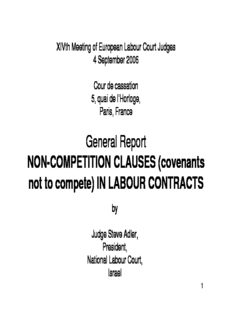Table Of ContentXIVth Meeting of European Labour Court Judges
4 September 2006
Cour de cassation
5, quai de l’Horloge,
Paris, France
General Report
NON-COMPETITION CLAUSES (covenants
not to compete) IN LABOUR CONTRACTS
by
Judge Steve Adler,
President,
National Labour Court,
Israel
1
Thanks
• To those who patiently answered the questions in the
questionnaire.
• Replies were received from Austria, Belgium, Finland,
France, Germany, Ireland, Iceland, Italy, Malta, the
Netherlands, Norway, Spain, Slovenia, Sweden and the
United Kingdom.
2
Main issues
• After conclusion of employee-employer relationship – is a
covenant not to compete enforceable? May an employee work for a
competitor or in a related job, or open a competing business after he
leaves his prior employer.
• During the employee–employer relationship – an employee may not
work for his employer’s competitor or in a related job, unless he has
permission from his employer [all jurisdictions].
• What is the proper balance between the employers’ right to property,
freedom of contract and the workers’ freedom of occupation?
• What are the social and economic factors involved in this balance?
• To what extent should social and economic considerations justify the
non-enforcement of contractual provisions?
3
Constitutional and special status provisions
• No country reported the existence of a clause mentioning non-competition
clauses in its Constitution.
• However, various constitutional rights relate to the issue of enforcing covenants
not to compete, such as:
– Freedom of occupation [Austria, Iceland, Israel, Slovenia, Germany, others]
• Right to work [Finland, sec. 18; Italy, art. 4; Norway, sec. 110]
• The duty and right to work and earn a minimum income [Spain]
• The protection of work [Italy, art. 35]
– The property (and ownership) right, including intellectual property, such as trade secrets
(generally referred to as the employers’ right, but do employees also have a property right in their
workplace?) [Slovenia].
– In some countries there are constitutional rights to: freedom of trade and commerce;
freedom of contracts; prohibition of unfair competition practices [Italy, Slovenia]; also,
autonomy of the individual.
– Declaration des droits de l’homme et du citoyen (Declaration of the rights of people and
citizens) of 1789: person free to do anything that does not harm another person; property basic
right; freedom of occupation [France].
– Constitutional Council – freedom of commerce and industry and freedom of contract are
constitutional values [France].
– Law governed by freedom of occupation, freedom of trade and industry and freedom of
competition (“principles” not clear if in Constitution?) [Belgium].
– Constitutional principles used by courts to interpret statutes [Austria, others].
4
EU treaties and directives
• No treaties or directives specifically mention covenants not to
compete.
• Treaty of Rome – art. 39 relates to freedom of movement for
employees).
• EU competition law – Directive v. December 18, 1986
(Abl. L382/17) limits the prohibition of competition for self-
employed commercial agents. Parties to contract can only
agree not to compete for two years.
5
Statutes
• Many statutes relate to covenants not to compete, directly or indirectly:
– Most/all countries have laws protecting trade secrets.
– Laws which relate to covenants not to compete:
• Germany – sec. 60 of HBG (Commercial Code), extended by case law to apply to
all employees; statutory restrictions on non-competition clauses which apply after
end of labour contract: sec. 110 and 74 of Industrial Code, Const. Court judgment
December 13, 1969 DB 1970.396; BGB, 242, good faith performance of contracts.
• Sweden – sec. 38, covenants binding only if reasonable.
• Spain – Workers Statute Act, good faith, forbids unfair competition, covenants
not to compete enforceable only during the employment contract, maximum 2
years for professionals and 6 months for non-skilled workers.
• France – Code du travail (labour code) prohibits restrictions on freedoms.
• Slovenia – Employment Act, art. 37, 38-40; Employment Related Industrial
Property Rights Act, art. 7, worker must protect employer’s secrets.
• Finland – Employment Contracts Act.
• Norway – Act Relating to the Conclusion of Agreements, 1918, s. 38.
• Belgium – Contract of Employment Act, 1978.
• Austria – statutes relating to non-competition during employment contract and
after its termination.
• Iceland – restraints will not unfairly abridge employee’s freedom of occupation.
6
Collective agreements
• Sweden – there is a collective agreement regarding airline
pilots which restrict their right to work for competitor. See
“cases”.
7
Court-made law
• In the countries which submitted reports many/most rules relating
to the enforcement of non-competition clauses were court-made.
• Court-made law is based on statutes (if there are any),
constitutional principles and policy considerations.
8
Two main theories why
a covenant is not binding
1. Protection of competition – neo-liberal view; the worker is an
instrument to further competition policy; the worker furthers the
diffusion of information which is necessary for a competitive
market.
2. Protection of workers – making covenants not binding protects
workers and allows them to receive the best conditions which the
market sets/they are offered.
9
Covenant is binding
Legal theories: when
If reasonable = “reasonableness test” [Austria, Germany, Ireland, Spain,
Sweden, United Kingdom, Iceland, others]. Below we discuss what is
reasonable:
1. If there is a legitimate employer economic interest,
2. limited in time and space, proportional and includes proper economic
compensation to the employee limited [Austria, France, Germany,
Italy, Spain].
2. If a written agreement: court may limit binding character when
employee interest unfairly prejudiced [Netherlands].
3. If a written agreement and employee does similar work and employee
acquired special knowledge from prior work [Belgium].
4. If employee engaged in unfair competition [Spain], disloyal
competition [Belgium].
Note: Some nations set maximum period for limitation of prohibiting worker from
working (see page 25).
10
Description:NON-COMPETITION CLAUSES (covenants covenant not to compete enforceable? May an employee .. 7:653 of Civil Code: covenant not valid

